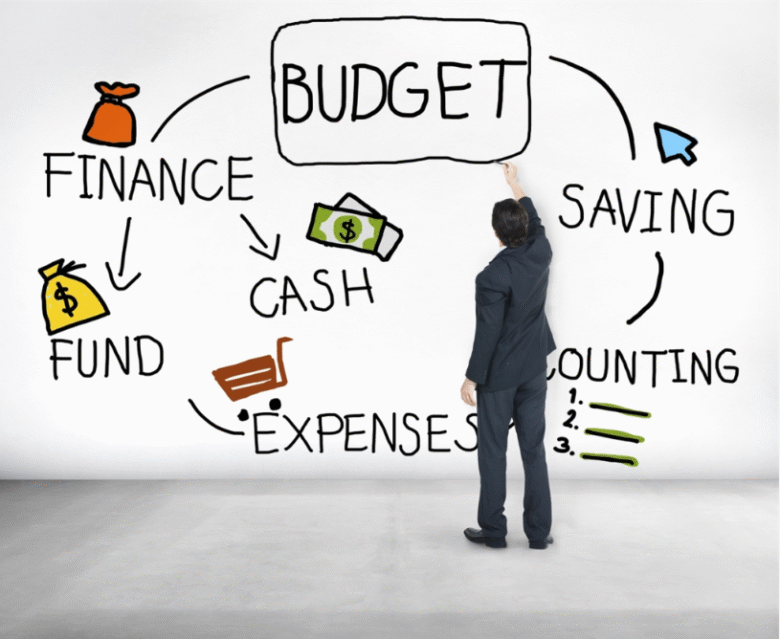Budgeting is a simple and effective way to manage your money. At its core, budgeting is developing a strategy for spending money. A budget is a strategy for spending money. It helps you determine in advance whether you have enough money to do the things you need or want to do. If you can’t afford everything, this planning method can help you prioritize your spending and focus on what matters most. Budgeting isn’t about putting limits on yourself; it’s about making sure your money is spent where it matters most.
Why Everyone Should Create a Budget
Budgeting is essential, no matter how much money you have. Whether you’re a student, a working professional, or a retiree on a part-time income, budgeting can assist you in living within your financial means and preparing for both planned and unforeseen expenses. Without a budget, it’s simple to lose track of where your money is going. You may need to use credit cards to get by at the end of the month. A good budget will help you understand your financial situation and make smarter financial decisions.
How Budgeting Helps You Understand Your Finances
Creating a budget can help you see your income and expenses more clearly. This increased awareness can help you understand where you’re overspending and where you might be overspending. Many people are shocked to discover how much they’ve spent on things like dining out or entertainment. When you know where your money is going, you can more easily make adjustments and cut back on less important expenses. This level of awareness is essential for managing your money and avoiding debt.
Smart Budgeting can Help you avoid debt.
One of the biggest benefits of budgeting is that it can help you avoid debt. When you know exactly what you’re earning and spending, you’re less likely to overspend or use your credit cards. Budgeting allows you to plan for major expenses in advance, which can help you borrow less money. It also teaches you the true cost of debt and the importance of living within your means. In the long run, budgeting can help you live debt-free.
Budgeting can Help People Learn to Save
Creating a budget can make saving easier. You can set aside a small amount from each paycheck to build up a financial buffer in case things go wrong. Many people struggle with saving because they don’t plan ahead. Budgeting addresses this issue by turning saving into a fixed expense. The practice helps you stay disciplined and ensures that you’re always saving for the future, whether it’s for retirement, education, or unexpected expenses.
Budgeting Reduces Financial Stress
Many people experience financial stress, often because they don’t know where their money is going or feel like they’re never making enough to cover their expenses. Budgeting can reduce this stress by giving you control over your money. With a plan, you can make decisions with confidence because you know exactly what you can afford. Budgeting also helps you prepare for crises and relieves the stress of unexpected expenses. Having a budget allows you to feel at ease, knowing that your finances are well-managed.
How Budgeting Helps Families
Budgets are not only necessary for individuals but also for families. By sticking to a budget, each family member can have shared goals and financial security. When families work together on a budget, they talk more openly about money, and children learn important lessons about it. This allows parents to plan for things like college tuition, vacations, household repairs, and emergencies. Budgeting also ensures that household expenses are managed responsibly, which can reduce arguments and bring peace to the family.
Budgeting for Different Life Stages
As you get older, your budgeting needs will change. A college student’s budget is primarily based on college tuition and part-time income. A young person may be preparing to buy a home or a car. Parents may need to prioritize the needs of a home, childcare, and school. Managing a steady income and medical expenses is crucial for retirees. No matter what stage of life you’re in, a budget can help you make the most of your money and plan for current and future financial obligations. A budget changes as you change, but it can still be a useful tool for your finances.
Making Budgeting a Lifelong Habit
Budgeting isn’t a one-time event; it’s an ongoing process that adapts to your changing financial situation throughout your life. Your budget should evolve as your income, expenses, and goals change. You need to review and adjust your budget regularly to keep it effective. Think of it as a living document that shows you the true state of your finances. Creating a budget is the first step toward long-term financial health and security. It becomes a part of your life that helps you stay organized, prepared, and in control.
Conclusion
Budgeting is an important part of financial management that helps everyone, no matter how much they earn or what stage of life they’re in. It gives you the tools you need to manage your money well, avoid debt, achieve your goals, and reduce stress. A budget doesn’t limit you; it gives you the freedom to make smart financial choices and plan for a better future. By integrating a budget into your daily life, you can achieve your financial goals and find inner peace. It’s not just about statistics; a budget is about using everything you have to create the life you want.
FAQs
1. Why is it important to make a budget, even if I don’t make a lot of money?
Even if you don’t make a lot of money, a budget can help you maximize your money, avoid debt, and achieve your financial goals. It makes every penny count.
2. How often should I review my budget?
You should review and adjust your budget every month or when there are major changes in your income or expenses.
3. Can I still enjoy life even if I have a budget?
Yes! Fun and free time are part of a good budget. The most important thing is to make a plan and stick to it.
4. What if I spend too much money in a month?
It’s okay to overspend sometimes. Take it as a learning experience and adjust your budget for the next month to stay on track.
5. Are there methods or tools that make budgeting easier?
Many people can track their budget using apps, spreadsheets, or envelope systems. Choose the strategy that best fits your goals and habits.




